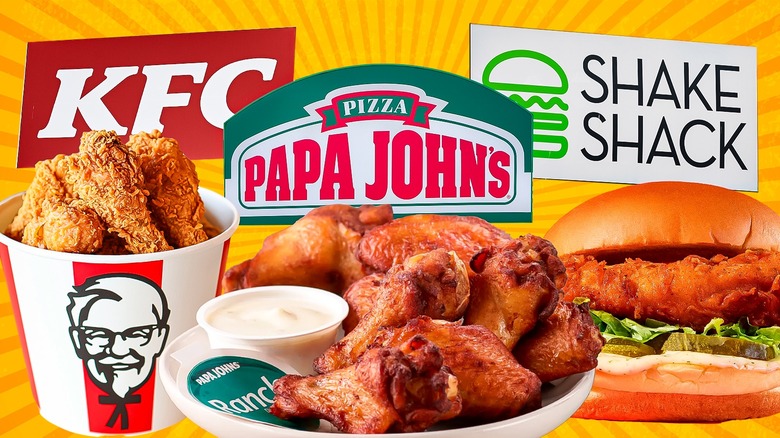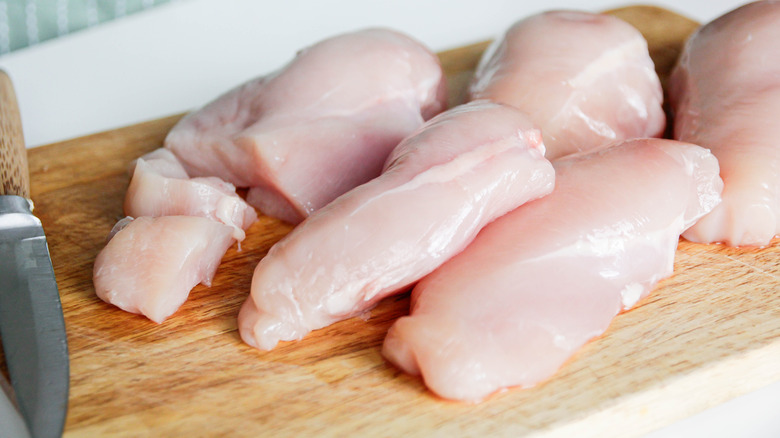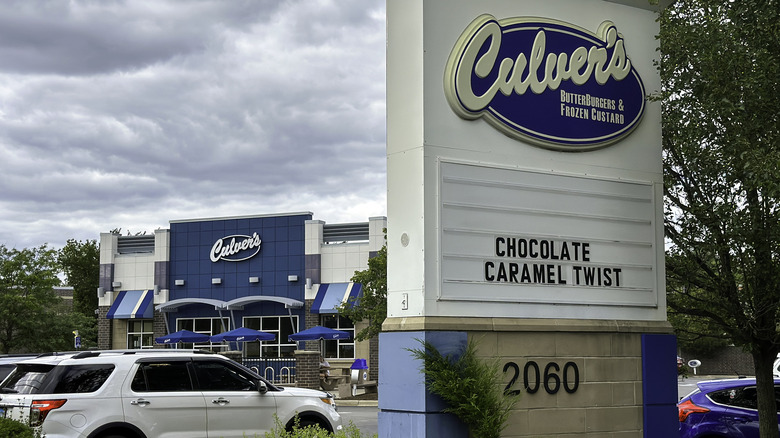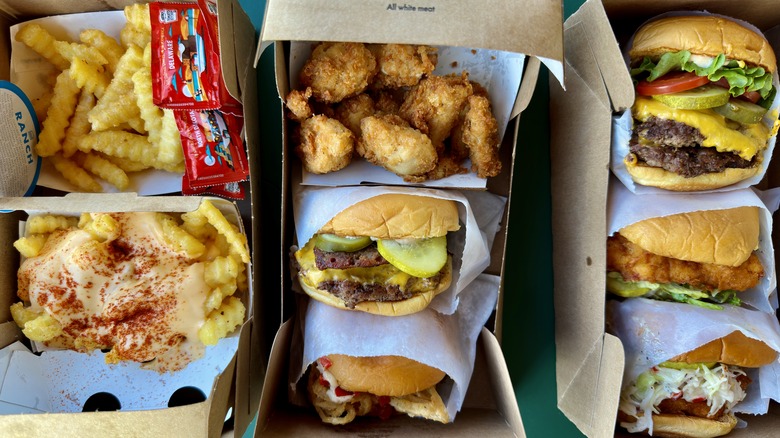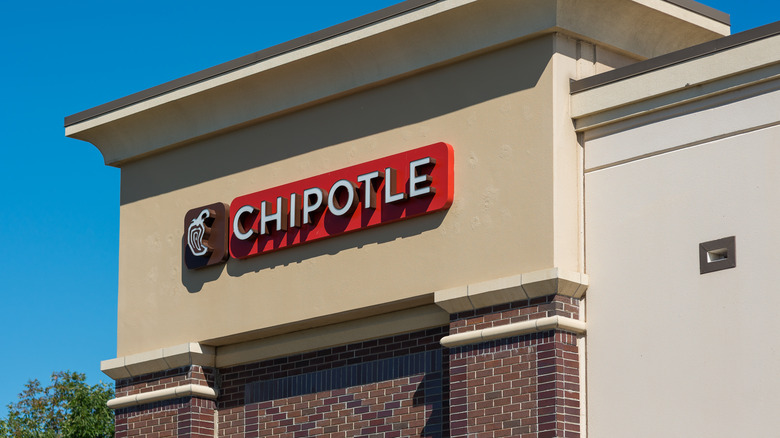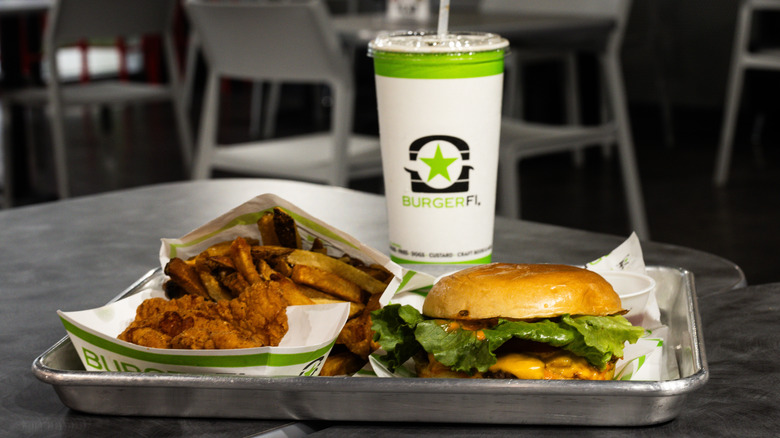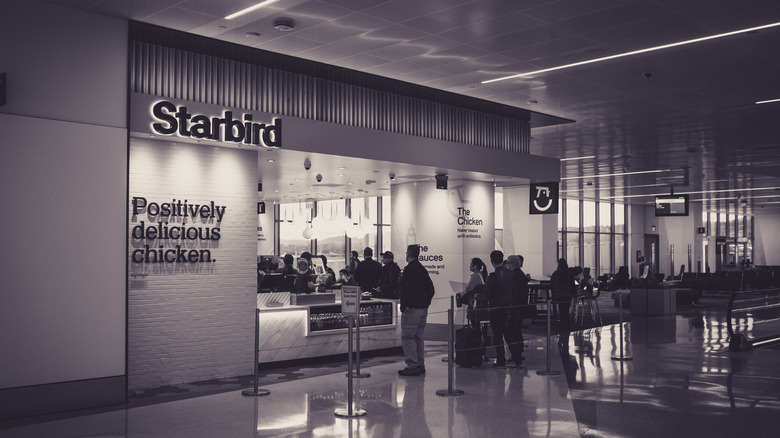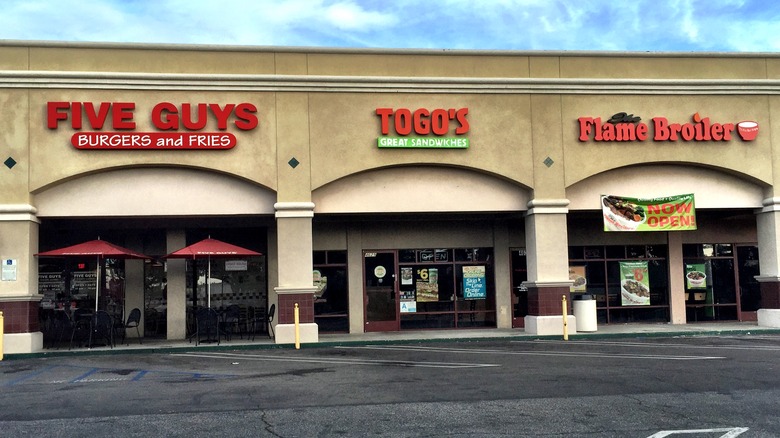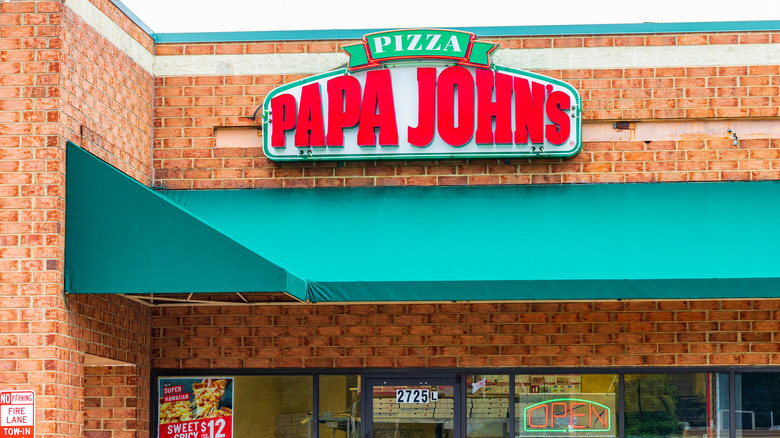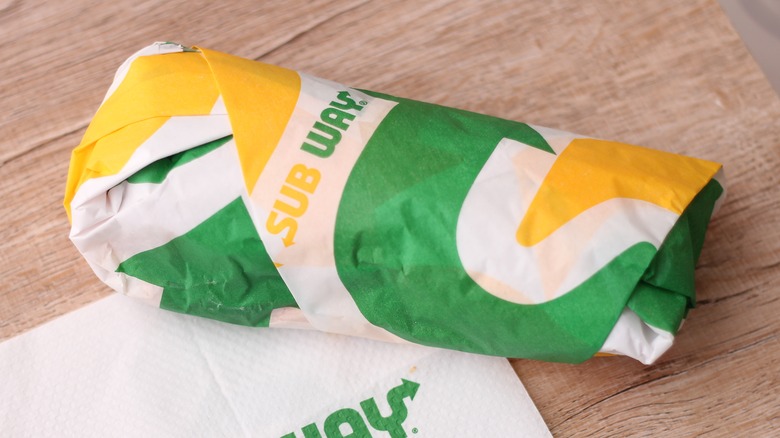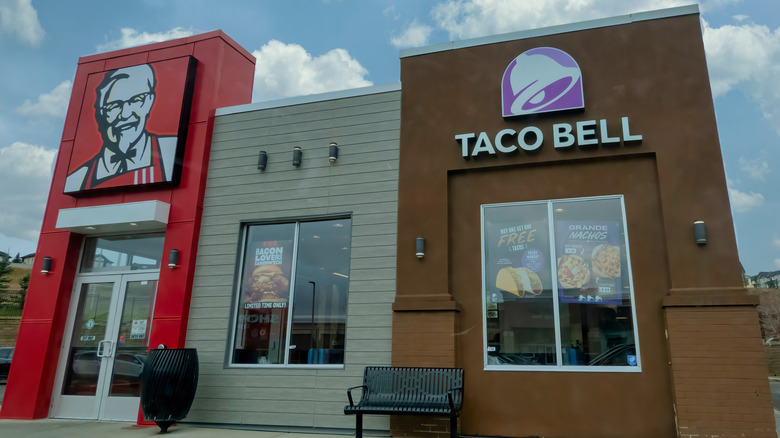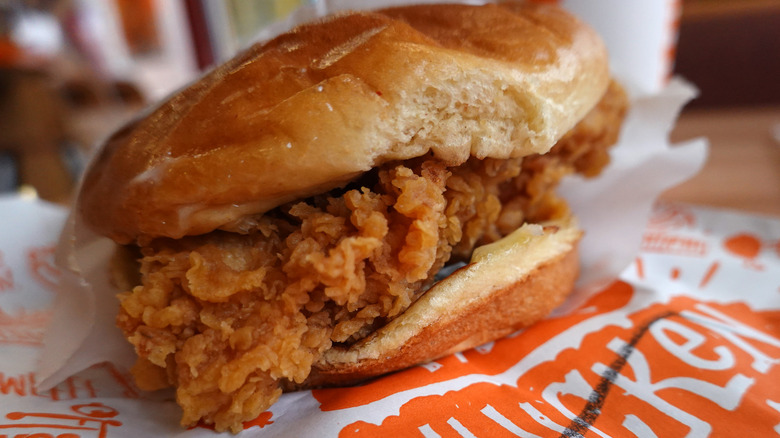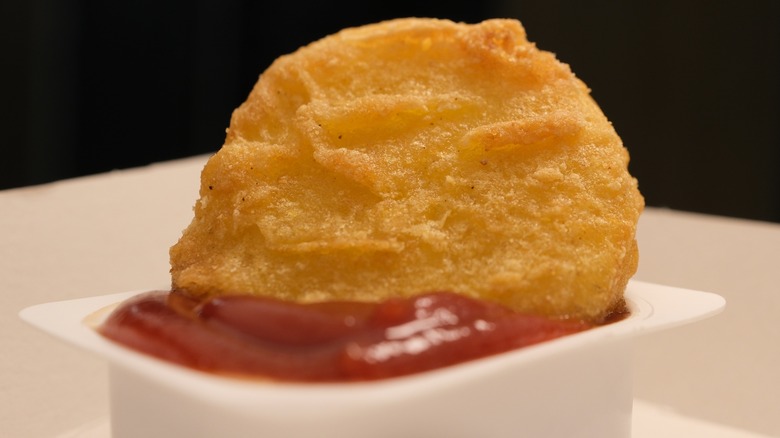Chain Restaurants That Use Quality Chicken
The push to get higher-quality food into restaurants has been upended by supply chain issues and cost-cutting. For example, both Chick-fil-A and Panera changing their animal welfare policies to allow either some antibiotic use or some use of feed containing animal products. For people who want to spend their money on chicken products that are as high-quality as possible — but that still satisfy those cravings for fast-food — those changes aren't very welcome.
However, chicken quality rests on a number of factors. Some are luck of the draw, such as the particular cook making your meal. A careless cook may produce a bad chicken sandwich, even if the meat itself is of superb quality, but other characteristics aren't so random. Antibiotic use is an easy metric to observe, for example; the flock is either exposed or not, and it's one of the more common changes made when companies look at chicken welfare. You'll see this pop up again and again in discussions over chicken quality. However, companies have varying policies in place regarding other facets of chicken conditions. With that in mind, here's a look at some chain restaurants that use quality chicken.
The Organic Coup
As of 2024, there's one chain that's apparently done everything it can to use what people would consider quality chicken, and it's a very small one in the San Francisco Bay Area. The Organic Coup first opened in 2015 in Pleasanton, California. The company was founded by two former Costco executives, one of whom was Erica Welton, a former Costco food buyer who had successfully pushed the massive warehouse chain to increase its organic offerings. The Organic Coup sold only fried chicken, but that chicken was USDA-certified organic. This meant the poultry was raised according to specific guidelines set by the USDA for issues like living conditions and feed quality. The chicken meat was also antibiotic-free.
Within 13 months of the original location's opening, the Organic Coup chain had expanded to eight locations, and it eventually had 13 open locations across the Bay Area and in Washington state. Some were standalone restaurants, but others were located inside sporting venues and universities. In December 2020, the chain quickly closed all of its locations temporarily. The Pleasanton location had to close due to the landlord not renewing the lease, but no reason was given for the others, save for speculation that the local surge in COVID cases may have contributed to the decision to shut down. As of 2024, the chain has three locations inside Oracle Park and Levi's Stadium, as well as a location at the University of San Francisco. It also has a line of retail products.
Culver's
While almost-national chain Culver's (it's located in 26 states across the U.S. and isn't limited to one specific region) hasn't gone organic, it has gone antibiotic-free for its chicken. In fact, it went antibiotic-free in 2011, and it sourced its chickens from a farm in Georgia that raises chickens in lower-stress conditions and that have 100% vegetarian feed. The chicken is American Humane certified, which means it meets at least 85% of the standards set by the American Humane Society for humane treatment and living conditions.
Culver's has been focusing on sustainable agriculture as of late. It also partners with farmers working toward sustainable farming in terms of animal treatment and issues like water use and erosion prevention through cover crops. It works with Thank You Farmers Project and U.S. Farmers & Ranchers in Action to promote farming education and improvement in the agricultural system in the U.S. While its specific, publicly available animal welfare policy documents seem limited to beef, it hasn't left poultry behind.
Shake Shack
Shake Shack has a detailed animal welfare policy for beef, chicken, and pork in which it appears to carefully spell out just which targets it's met and which ones it's still working on. The company adopted a policy called the Better Chicken Commitment (BCC) in 2016. This is a set of standards created by scientists who worked with animal welfare, and several fast food companies have signed on, including Burger King, Subway, and Shake Shack. There are two versions of the BCC, with the first one using auditors and labeling from the Global Animal Partnership; this is the version that Shake Shack has been following.
The company gives a lot of detail on its website about which parts of the BCC it's managed to meet. As of 2023, it acknowledged that it still had to improve stocking density, which is the number of birds per a certain amount of space; controlled atmosphere stunning; and slow growth breed. It has met 100% of the requirements for lighting, litter, and enrichment. The company uses antibiotic-free chicken and vegetarian feed, and it requires that the chickens it uses be cage-free and have enough room to expand and flap their wings. Eggs are 100% cage-free, and the hens are given space to move around, flap wings, and participate in normal behavior. such as dust-bathing.
Chipotle
Chipotle is another BCC subscriber that aims to serve quality chicken, and its chicken is also antibiotic-free and vegetarian-fed. The chain is also a great example of how the employees can make or break the image of the food being high- or low-quality; you'll find some complaints online, for example, about low-quality food at Chipotle, only for others to chime in that the location near them has great food, and that it comes down to who's doing the cooking. This means that, if you think you've gotten some low-quality chicken at Chipotle, try another location.
One thing you should keep in mind regarding vegetarian-fed chickens is that this may not always refer to what you think. Chickens do eat "animal" products like insects naturally, and if you let chickens forage and run around a pasture, you can't really stop them from eating those bugs. They'll even eat mice and snakes, so some chicken farms won't say they raise 100% vegetarian-fed chickens because of this natural instinct. Those that do claim to feed chickens a vegetarian diet are referring to only what the farmers feed the chickens. The feed provided by the farm is vegetarian with no animal by-products. However, keep in mind that chicken in a pasture may just be gobbling up a few grasshopper snacks in between those vegetarian meals.
BurgerFi
BurgerFi claims to have "all-natural" chicken, which isn't very descriptive, but it is specific in its antibiotic policy. All chicken used at BurgerFi is antibiotic-free. The company briefly ran a promotion in May 2024 in which it changed its name to ChickenFi on social media when it introduced new chicken sandwiches.
BurgerFi's use of chicken is actually pretty recent; the chain added the poultry in 2018 after being open for seven years. The source of the chicken will seem familiar: it's from the same Georgia farm that Culver's gets its chicken from. The company also supports the Five Freedoms, a set of requirements regarding quality of life set forth by the American Society for the Prevention of Cruelty to Animals and the World Organization for Animal Health. It also has said it aims to meet Global Animal Partnership standards for its supply of broiler chickens. These standards include having more space for each bird and improving natural lighting and waste management in chicken housing. One of the requirements, notably, is to improve breeding and promote better welfare outcomes.
Starbird
This next entry is another smaller chain, located in California. Starbird Chicken first opened in San Francisco and, as of 2024, has expanded down into Los Angeles County. The company proudly promotes its chicken that's antibiotic-free, and that is never frozen. While freezing food isn't always a sign of poor quality, "frozen" chicken just doesn't sound quite as good as "fresh" from a marketing standpoint. It is possible for frozen chicken to be left frozen for too long, resulting in freezer burn and a general decline in quality. Either way, Starbird doesn't freeze its meat, so there's no issue with the potential downsides of freezing affecting its food quality. Starbird also sources locally raised chicken for its menu, which helps it stick to its fresh-only requirement.
Starbird was briefly the target of controversy in 2019 when an animal protestor ran onto the field at Levi's Stadium near San Francisco. The act was part of a series of protests that had rattled the restaurant industry as protestors tried to get companies to stop sourcing birds from Petaluma Poultry. However, Starbird had already stopped working with Petaluma Poultry several months before the on-field stunt.
Flame Broiler
Flame Broiler is a Korean fast-casual restaurant with locations in California, Arizona, Texas, Oklahoma, North Carolina, and Florida. The chain first opened in 1995, and in 2019, the company switched to using what it called NAE chicken, or No Antibiotics Ever chicken. The CEO said the move was made in order to provide food that was more nourishing than harming to people's bodies and to be more transparent about their products.
The company has said it aims to source quality ingredients and also has foods like non-GMO rice and Angus beef on the menu. Reviews online are generally positive; they squarely lump Flame Broiler in the same group of restaurants as Yoshinoya but often say the food at Flame Broiler is better. Comments have singled out the meat quality as good, although these weren't specific about whether the "meat" in question was beef or chicken, or both in general.
Papa John's
Pizza chain Papa John's has had to deal with some tough times due to its 2017 and 2018 controversies. Its founder blamed the chain's problems on protests against police brutality and then used inappropriate, racist language on a recorded phone call. The company has survived, though, and it tries to use chicken that's actually rather high-quality, although the pandemic threw a wrench in its plans.
In 2016, the chain announced that it was switching its chicken pizza toppings and its chicken poppers to antibiotic-free chicken. It also transitioned its chicken sources to those that used a vegetarian diet. In June 2021, however, it announced that due to the continued supply-chain problems that the pandemic had created, it had to switch to including chicken that received antibiotics that weren't medically important to humans. As of 2024, it's still using this type of chicken. That does mean that if you order their chicken products, you should be aware that they aren't completely antibiotic-free anymore.
Subway
Subway, as you may remember, follows the requirements set forth in the Better Chicken Commitment. It's long been trying to remove antibiotics from its products. In 2015, the company announced that it wanted to transition all its chicken to antibiotic-free by 2016, its turkey products by 2019, and its pork and beef products by 2025. Its animal welfare policy follows the Five Freedoms, and it expects its franchisees to follow its lead on using antibiotic-free products. In other words, this isn't just the company setting up a policy for a select group of stores; all its stores are supposed to use meat that meets these targets.
In 2016, Subway made its first concrete move into the world of antibiotic-free chicken with the introduction of rotisserie-style, white-meat chicken sub sandwich that also contained no artificial flavors or colors. The company has since succeeded in making all its chicken products antibiotic-free.
KFC and Taco Bell
Both KFC and Taco Bell belong to Yum! Brands, along with Habit Burger and Pizza Hut. Yum! created a company-wide animal welfare policy in 2002 that focuses on living conditions and behavior, and in 2019, Yum! signed on to the U.S. Centers for Disease Control and Prevention's Antimicrobial Resistance Challenge. In 2020, the company created a list of chicken "key welfare indicators" to put more focus on issues like chicken mobility. Some of the separate chains within Yum! have followed their own timelines to accomplish certain goals so far, but Yum! itself has set deadlines for its chains to meet certain numbers.
Most of the chains within Yum! have initiated changes to their poultry sourcing to reduce antibiotic use. KFC was able to reduce its use of chickens exposed to antibiotics in 2018. Now the chain uses only chickens from flocks where antibiotic use is limited to those that are not considered medically important to humans. Taco Bell met that goal in 2017 and also transitioned its egg supply to all cage-free in 2016. Pizza Hut announced in 2018 that it would transition to using wings from chickens that were not given antibiotics that were medically important to humans, and it was supposed to meet this goal in 2022. Yum! has stated it wants to switch to all cage-free eggs in the U.S. and other markets by 2026, and it supports global efforts to reduce antibiotic use.
Popeye's and Burger King
Like Yum! Brands, the separate chains within Restaurant Brands International (RBI) have been switching to using chicken and eggs that meet certain standards. The company admits that it can use its influence to promote better living conditions for poultry and has committed to doing so. However, RBI does have a company-wide animal welfare policy and goals that its chains need to meet, and the company has been putting together its own key welfare indicators for poultry.
As for the separate chains, Popeye's, Tim Horton's Canada, and Burger King no longer use chicken exposed to medically important antibiotics, although the flocks may still receive antibiotics that aren't used in humans. Burger King vowed to meet that requirement by 2018, and Popeye's made the switch in 2022. Popeye's has gone further and announced that it would remove artificial preservatives, colors, and flavors from its fried chicken. In 2023, it introduced one sandwich made with chicken that was completely antibiotic-free. RBI is also supporting a global move to use cage-free eggs by 2030.
McDonald's
McDonald's is often popularly associated with having low-quality food just by virtue of it being fast food. That reputation hasn't been helped by the 2024 E. coli outbreak that affected many people (although the source of that outbreak appears to be onions from a third party, according to NBC News, and not McDonald's beef). The company has worked to improve the quality of its food overall, and its poultry welfare efforts have been substantial. The company has put policies into place over many years to address chicken living conditions and feed quality as well as antibiotic use.
As early as 2003, McDonald's had started addressing antibiotic use and soy in chicken feed, particularly soy grown on deforested land in the Amazon. The company uses third-party monitoring and verification and works with the World Wildlife Fund to work on sustainable policies. It has also removed antibiotics that are medically important to humans out of the poultry chain. The company still uses chickens from flocks that get some non-important antibiotics but completed the switch way back in 2016. All eggs used in U.S. and Canada locations come from cage-free hens as of 2024. And those are just some of the changes. These may not be perfect, but they sure aren't chicken feed — pun fully intended.
